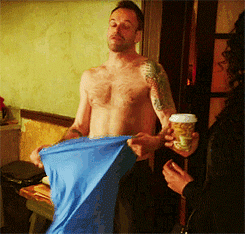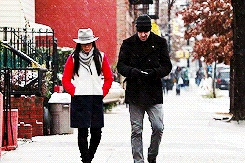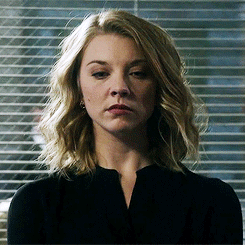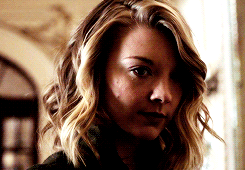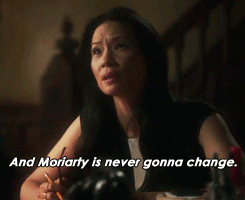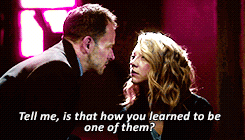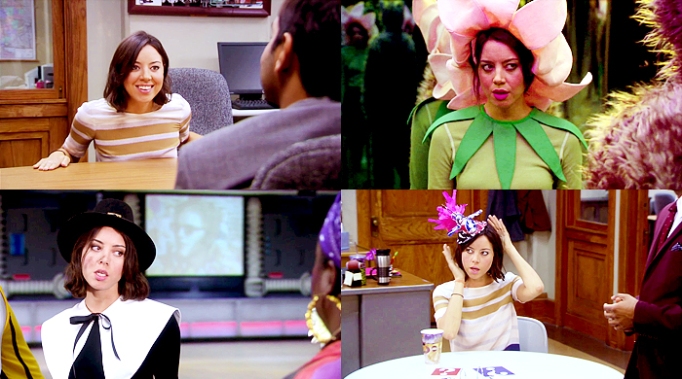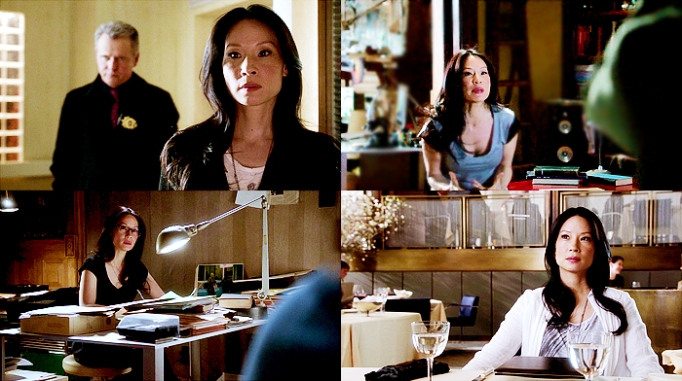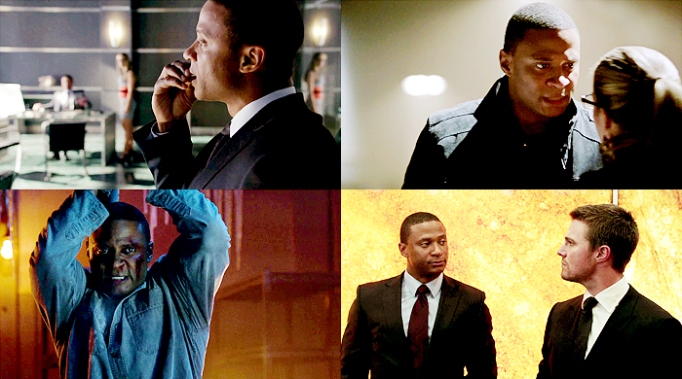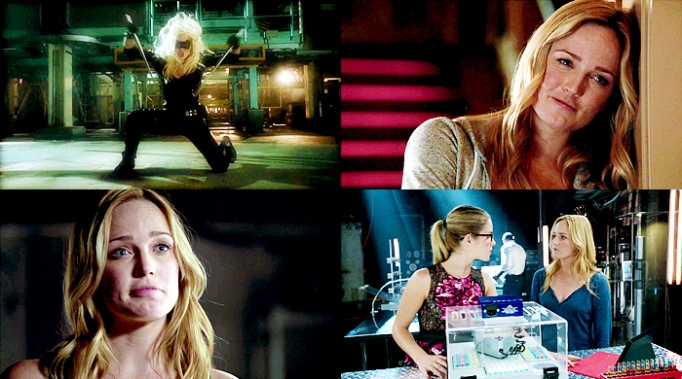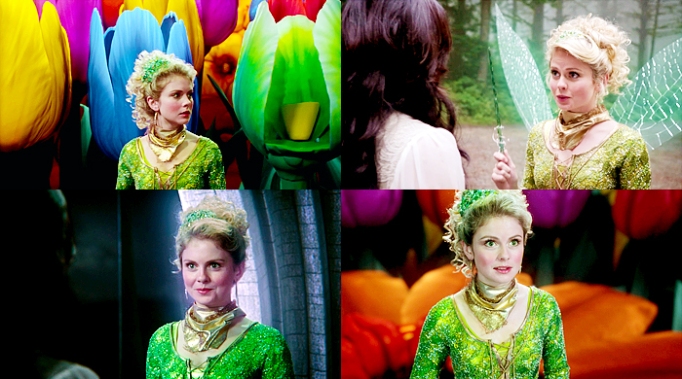**This post contains spoilers for the most recent episode of Elementary, “The Marchioness.”**
“I often wonder if I should’ve been born in another time. Sorry, my name is Sherlock, and I’m an addict. My senses are unusual, one could even say unnaturally keen. And ours is an era of distraction, it’s a punishing drumbeat of constant input, this cacophony which follows us into our homes and into our beds, seeps into our souls, for want of a better word. For a long time, there was only one portus for my raw nerve endings, and that was copious drug use. So in my less productive moments, I’m given to wonder… if I had been born when it was just a little quieter out there, would I have even become an addict in the first place? Might I have been more focused? A more fully-realized person?”

If you missed Elementary this week, I beg you, please stop reading right here and go watch the episode. This one will go down as one of my favorites, because we got some real development from Sherlock that we haven’t seen since the first season. It’s not that he was in stasis until now… it’s just that we can’t have these leaps in development every week, otherwise they’ll start to mean nothing after a while. This week, Sherlock’s in group and he confesses something real, something revealing, something that he’s not even confessing to Joan because he’s at this meeting alone. It’s also a nod to the canon because Sherlock says he would choose to live 200 years ago, when there’s still the “wonders of modernity,” but “before everything got amplified.”
The moment is ruined by Fatty, aka Mycroft, who is lounging across the aisle and interrupts Sherlock’s rather beautiful soliloquy. Sherlock has a predictably strong reaction to his brother’s presence (I want to emphasize again that Joan was not in this meeting, she’s waiting out in the hallway for Sherlock, so this speaks to the level of privacy and anonymity that Fatty just breached) and storms out of the meeting. It’s clear from Sherlock’s overreaction that his previous speech was sincere, and he thunders that Mycroft lives in England, enabling Mycroft to make a sarcastic comment about planes.

Things are awkward between Joan and Mycroft, who can’t decide on a hug or handshake. Turns out Mycroft is here because he’s opening a restaurant in Tribeca in a month, but he flew out early because he needs Sherlock’s help with a friend of theirs. Sherlock: “We haven’t got any mutual friends.”
Mycroft has a beautiful restaurant, and now I want to eat at the real one, but Sherlock is horrified to find that his and Mycroft’s mutual friend is none other than Nigella Mason, Mycroft’s former fiancee. Sherlock succinctly recaps their shared history: “I seduced you within weeks of your wedding and exposed your true character to Mycroft.” Then Sherlock has to suffer through Nigella explaining her current predicament: She married a Marquess, which makes her a Marchioness, which backs up Sherlock’s assertions that Nigella is a “social-climbing trollop.” She’s retained her title even though she and the Marquess are divorced, and she also managed to retain her husband’s champion stallion, Silver Blaze. (That name should look familiar to fans of the canon.)

Sherlock snips, “So you’ve become a horse pimp. How fitting! Must be lucrative!” The amount of vitriol he spews at Nigella is interesting, because she is still a woman he seduced to the point of sleeping with her. When you look at the myriad of terrible people Sherlock has encountered since the series started, excepting Moriarty and Sebastian Moran, he always has a sort of detached disdain for even the worst sorts of people. Bombers, bankers, common thieves, even his hatred of the woman who profiled him as a drug addict was less intense than the hatred he has for Nigella. It’s because he hates his brother for being too weak to see Nigella for who she really is, which in turn makes him hate Nigella twofold for duping his brother. And here he is, sitting at a restaurant with the two of them, hating them both all over again for staying in contact.
Anyway, The Marchioness tells them that Dalton, her boyfriend and the caretaker for her horse, was murdered at the stables after encountering an intruder intending to poison Silver Blaze. “So you want us to find him and protect your meal ticket.” For what it’s worth, up to this point, it seems like Sherlock is unhinged; Nigella seems nice enough, and she patiently sits through his constant tirades.
The Marchioness also lets it slip that Mycroft was sick, and Mycroft offers the following explanation to his confused brother, I kid you not: “Spot of leukemia. Bone marrow transplant. I’m better now.” Sometimes the Brits talk like they’re still confined to the amount of words that will fit in a telegram. “Spot of leukemia, stop. Bone marrow transplant, stop. I’m better now, stop.” We need to be careful, or our children are in danger of always speaking like they have a limit of 140 characters. Sherlock offers up his sincere apologies for his brother’s spot of leukemia but…


Back at the Brownstone, Joan does a bad job of deflecting Sherlock’s questions about Mycroft as she tries to make him explore his feelings about the leukemia. Sherlock says he’s annoyed that his brother is a cliche wrapped in an enigma from the lips of a ghost in the shadow of a unicorn’s dream, because of course it’s an illness that brought about this change in ol’ Fatty! How very bourgeois of him.
The doorbell rings and it’s Fatty, here to apologize for not telling Sherlock about his sickness. “You needed bone marrow! A sibling is the most likely match by far!” Mycroft attributes that to his stubbornness, but really? I went through the leukemia thing two years ago with a loved one, it’s really hard to imagine that person being like, “No, don’t call my brother, I’m very stubborn and would rather die than ask for his help.” The truth is, Mycroft was probably very sick and very frightened that Sherlock would say no, which would be a terrible way to die. The alternative is that Mycroft was being altruistic by not telling Sherlock of his problems, but Mycroft doesn’t seem like the altruistic type.

Sherlock tries to downplay the change Mycroft is going through, but Mycroft likens it to addiction which shuts up Sherlock. Mycroft then explains that Nigella helped organize a drive to find a bone marrow match for Mycroft, and he was lucky enough to be matched to a random donor. (He was also lucky that the bone marrow transplant worked, that his body didn’t reject the donation, and that it was enough to eliminate the cancer. Sherlock is likely aware of the astronomical odds that his brother made it through all of that.) Mycroft adds that if he and Sherlock work together to help Nigella, “It will prove tangibly that we’ve put this whole thing behind us.”
The next day, the two consulting detectives and the restaurateur investigate the stables, where Sherlock bickers with Mycroft and gets a set of prints off of a tree. You read that right: A set of prints off of a tree. The Marchioness and her case are only interesting because of the role it plays in bringing the Holmes boys back together, so it sucks that the case itself is kind of boring. In fact, we never see bodies or a crime scene, we were lucky to even make it into the 11th precinct before the last act, and most of the case is recounted by different characters.
Mycroft has qualms about taking the evidence from the local police; funnily, Joan just blows past it and helps Sherlock to examine the contents of the horse assassin’s abandoned bag. They come across a four-digit number that means nothing to any of them, and then Detective Bell (not to be confused with all of the other detectives, whom Sherlock calls Not Detective Bell) comes in wearing a ridiculously tight shirt.

You thought I was kidding. Look at this shirt. How does he even move his arms?!
He tells them the prints they found were a match to prints found at the scenes of thirteen other murders. Insane, right? I thought this was about horses.
The culprit appears to be an assassin that is known as El Mecanico, and he works for a drug cartel. When the four-digit number turns out to match the room number for the Marchioness at her current hotel, Sherlock helps her to narrowly avoid death by a sniper. She’s brought in for questioning, during which she lands such gems as “I’m in the peerage!” and “Dalton was an alternate on the national steeplechase team!” as evidence of her innocence. Hilariously, Sherlock has to translate this Rich White British People language for the peasants in the interrogation room.

Mycroft cooks dinner, which really pisses off Sherlock as he rails against indulgences and throws folders on the cutting board. He hates when Fatty plays house husband. Sherlock warns his brother once more that Nigella is probably not a good person: “You seem quite invested in the idea that Nigella has changed.”
“From what I can see, change is sloppy. It’s a process, not an absolute state. Why are you so invested in the idea that Nigella has to be a good person to deserve your help?”
Fair point, brother.

Mycroft and Sherlock aren’t the only brothers with problems, you know.
At dinner, Joan is in raptures over Fatty’s risotto, but Sherlock can’t handle the tension that only he can sense. Seriously. There’s so little to go on as far as chemistry between Joan and Mycroft that it seems like Sherlock is just fabricating tension. Mycroft excuses himself and leaves the Brownstone. After Sherlock stares down a rambling Joan, he finally deduces, disgusted, that Joan and Mycroft did have sex during their London trip. He sits in horror as Joan flips her hair and stalks away.
The next morning, Sherlock does his absolute best to make the car ride as awkward as possible for everyone involved.


Somehow, this whole case comes back around to horses and “WHORLS!” When the stable owner asks why the NYPD wants to see her baby horse, Sherlock sums up the case perfectly: “It’s a winding tale. It involves the British peerage, syringes full of concentrated potassium, and thirteen drug-related murders.”
He gleefully tells Mycroft, “Nigella Mason is a horrid witch,” but he knows why someone in the drug cartel would have it out for her. Turns out the Marchioness lost Silver Blaze to heart failure only ten weeks after her divorce, so she’s been passing off his brother as the real thing. She’s charging tens of thousands of dollars to people who want Silver Blaze to impregnate their horses. It’s horse fraud. The drug kingpin planned to poison the impostor horse before killing Nigella and Dalton.
So now that Sherlock established a connection between the Marchioness and El Mecanico, the objective is to identify the assassin. Sherlock and Joan are examining the evidence at the Brownstone when Joan brings up the subject of her relations with Mycroft, but Sherlock’s reply surprises her.
Sherlock: “It’s not the act itself that gives me pause, it’s that I can’t put it into context. There is a certain intimacy which is a byproduct of our partnership. We work well together, and I think we both value that fact, right? You must’ve known that I would deduce that you had slept with my brother. It is unlike you to introduce such a free radical into an otherwise highly functional relationship, unless, of course, the unlikelihood was precisely the point.”
Joan: “Do you think you’re maybe overthinking this?”
Sherlock: “You wanted to demonstrate that I don’t have a monopoly on boorish or outrageous behavior. Then you won’t become a slave to the roles we’ve assigned each other. I’m glad we cleared the air. Message received.”
Joan: “There was no message.”
Breezing past the abandonment issues, this is another case of Sherlock not quite getting it. Mycroft is a charming, seemingly sweet man who can cook, and even if I can’t see the chemistry between them, that doesn’t mean Joan can’t act on her feelings. Sherlock’s problem is that he’s incredibly self-centered, to the point that he sees everyone in his life as objects that orbit around him: Joan orbits him the closest, then Gregson and Bell, etc etc, until we get to Mycroft, who orbits the furthest. But no matter how far away Mycroft gets in his orbit, Sherlock is always going to believe that all of his brother’s actions are directly related to himself. Sherlock is special in the sense that people do tend to rearrange themselves and their lives to suit his needs, but that gives him the false belief that they orient all aspects of their lives around him.
What Sherlock essentially sees is two people purposefully forging an intimacy outside of him. He thinks he knows why they’re both doing it (Mycroft out of vengeance, Joan out of a need for independence) but if their coupling had anything to do with Sherlock, it was because they were searching for an intimacy in each other that neither could get from him. Still, that’s not to say either or both of them had this objective. As Joan said earlier in the episode, two consenting adults had sex. Really, that’s as much as Sherlock needs to know. We never revisit this thread in the episode, and I like that. Joan deserves some mystery, she deserves to have some aspects of her life be unsolvable by the great deductionist. Part of me hopes we never find out any deeper meaning for her tryst with Mycroft, but he’s returning next week, so we’ll have to wait and see.
Sherlock distractedly goes back to an interrogation tape, where he randomly figures out that the man being questioned has four fingers on his left hand, just like the set of prints they found on the tree. They go to Gregson with their evidence, but Bell rightly points out that there’s not enough to warrant an arrest. Sherlock cooks up a trap which succeeds in catching El Mecanico, but the prints don’t match because this case needed one last twist in the form of fake fingerprints. It’s not really worth explaining.

Like John Diggle on “Arrow,” Detective Bell always makes the most of his limited screentime.
Mycroft is genuinely impressed with Sherlock’s talents, even going as far as expressing his sympathies when it appears Sherlock got the wrong man. Sherlock and Joan take a trip up to Denning, where they meet an awesome lady ex-sheriff, and they discover the identity of the man whose fingerprints El Mecanico had stolen. Case solved.
I have to say, my interest in this case hovered between 50%-70% depending on what was happening (horses = snooze, sorry) but if the English peerage hadn’t been involved–if a Marchioness weren’t at the center of the case–it probably would’ve stayed around 20% for me. It really is that easy to make me care. This show is finding its strength in the character interactions, and the cases aren’t as easy to solve as they once were, but it’d be nice to get back to some “Leviathan” or “Déjà Vu All Over Again”-type cases soon.
Mycroft asks Joan to accompany him to the opening of his restaurant, as his date, but Joan expresses hesitation because of the ramifications it could have on her relationship with Sherlock. Mycroft insists that he’s happy Joan is in his brother’s life, “And I would like very much the chance for you and I to become friends.”
The episode ends with Sherlock and Fatty sharing a coffee at the empty restaurant’s bar.
“Where does that leave us, then? What would you like to talk about?”

Next week: A rom-com-y promo hints that Mycroft wants Sherlock to move back to London–and Sherlock gives Joan the option to come with him. Will it end with a run through the airport and a tearful hug? Is someone going to hold up a boom box outside of the Brownstone window? Will Sherlock stand outside Joan’s door, holding up a sign that says “To Me, You Are Perfect”? Tune in next week to find out! (Spoiler alert: Joan is perfect.)
